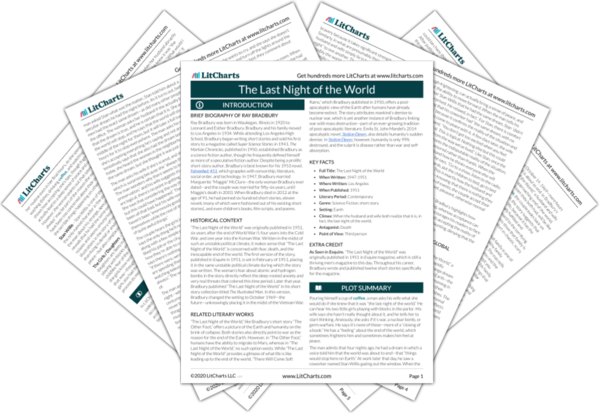Fear and Bravery
In Ray Bradbury’s short story “The Last Night of the World,” set in 1969, a husband and wife talk over coffee about a mysterious dream they each had, which announced that the world would end sometime that night. At first, the woman is fearful—as seen by her denial and anxious speculation—which hinders her from being able to accept reality. However, once she finally faces the circumstances and is honest with herself and her husband about…
read analysis of Fear and BraveryDenial and Acceptance
In “The Last Night of the World,” a husband and wife come to terms with the impending end of the world—which, according to an ominous dream they both had, will happen that very night. The husband and wife initially give in to denial, obviously not wanting the dream to be true. However, this coping mechanism proves unproductive, unsatisfying, and even isolating, as it keeps the couple from being able to grapple with the situation together…
read analysis of Denial and AcceptanceSelf-Absorption vs. Global Awareness
In Bradbury’s “The Last Night of the World,” a husband and wife prepare for the rapidly approaching end of the world. According to a strange dream they both had—along with seemingly everyone on Earth—the world is going to end that very night. Instead of “screaming in the streets,” however, the husband and wife maintain their quiet nighttime routine, sipping coffee and washing dishes. The short story suggests that, while this may be an act of…
read analysis of Self-Absorption vs. Global Awareness
Family
It’s the evening October 19, 1969—mere hours before the world is about to end. In Bradbury’s “The Last Night of the World,” a husband and wife come to terms with the rapidly approaching end of the world, which, according to a haunting dream they both had, will be like “the closing of a book.” Over coffee, the couple looks back on their lives. Through their reflections, the story suggests that family is the most…
read analysis of Family






